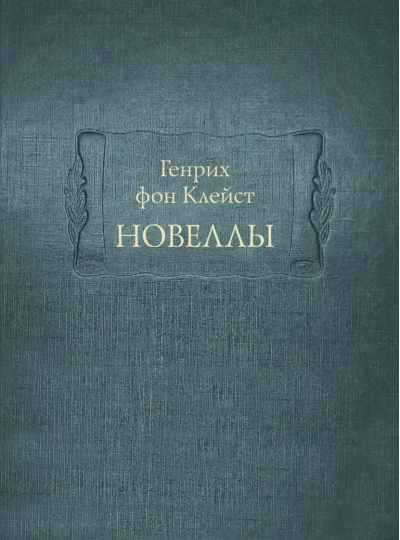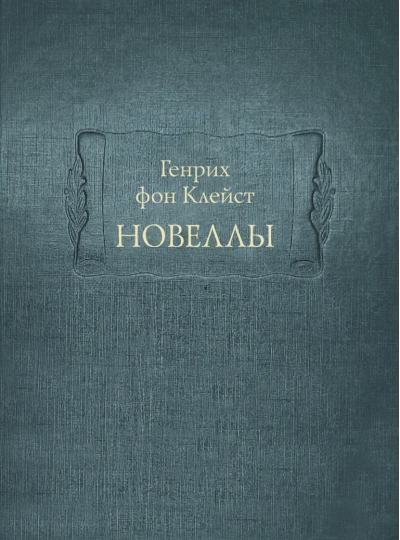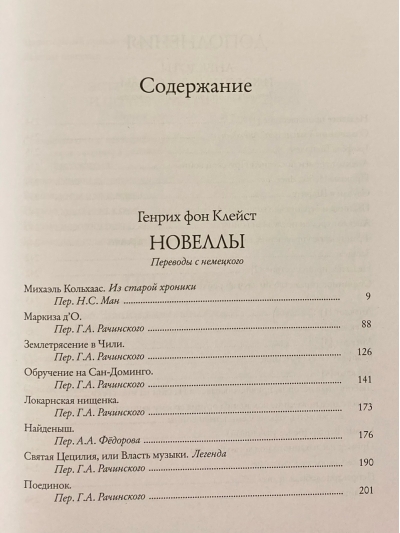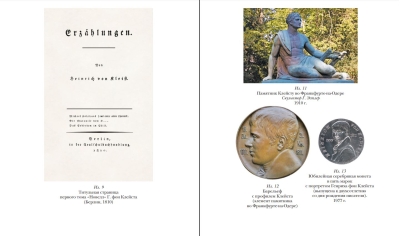Novels
69.99 €
55.99 €
In stock
The novels of Heinrich von Kleist (1777–1811) – an excellent romantic writer, master of the “small form”, founder of the short story genre in German literature – are rightly considered the pinnacle of his skill. These texts were admired by contemporaries such as Wilhelm Grimm and Achim von Arnim, and continue to arouse the delight of readers years later; it is not for nothing that Ludwig Thicke saw in their author the heir to the great Cervantes, and a master of words such as Thomas Mann will call one of them “the best novel written in German”. In the history of literature, Kleist entered as the most tragic of the German romantics, a kind of antipode of J.-V. Goethe, in which, as the author of Faust asserted, he “always aroused horror and disgust, like an organism beautifully created from nature, gripped by an incurable disease.”
Eight texts – a complete body of novels presented in this edition – amaze with diversity, depth and diversity. Kleist created novels of extraordinary emotional power, turning the story of an accident into a work where social and ethical conflict is brought to the greatest tragic tension. Masterfully possessing (even before Walter Scott!) historical imagination, Kleist places the reader in a variety of epochs: in Germany of the Reformation, torn by spiritual strife and knightly arbitrariness; then in the shaking of the monstrous earthquake of Chile, then in a paradise valley like Eden, then in besieged garrisons, then in medieval castles, then on tropical islands, covered with a storm of bloody slave uprising. Kleist’s prose is innovative: he acts in it not only as a fine stylist, but also as a master of paradox, sarcasm, black humor, and in the behavior of his heroes, the trickery of Ulenspiegel, the Kafkaesque absurdity, and even antics in the spirit of the brave soldier Schweik is through.
In the "Additions" section, Kleist's small prose is published. Here again, we see the widest genre range - from brief historical "anecdotes" and sketches on the rarities of the day to stories imbued with a romantic spirit and fairy tales. The second part of the Supplements consists of Kleist’s philosophical essays – his reflections on the meaning of being, on the attainability of happiness, on the nature of creativity, on inspiration and art – reflections, not only rooted in contemporary aesthetics, but also turned to the XX century, anticipating the ideas of mass psychology, phenomenology and neurolinguistics.
The publication is supported by a luxurious scientific apparatus. The basis of it is an article by A.I. Ivanitsky, in which Kleist’s creative path is traced in detail against the background of the storms and spiritual throwings of the writer that shook Europe; it is shown how the Kleist character, rushing between sinister fate and higher Providence, turned into a “playground of passions”, retains, however, a human face and does not lose the presence of the spirit. In his work, Kleist masterfully combines the high humanism of the Renaissance, the philosophy of the Enlightenment - and the mystical spiritual vertical characteristic of the Middle Ages.
Extensive commentary, prepared by the remarkable historian A.A. Konoplenko, will allow the reader to plunge deeply into the world of Kleist prose and better understand this amazing, versatile author with his phenomenal for his time erudition.
Recommended to the widest range of readers.
Eight texts – a complete body of novels presented in this edition – amaze with diversity, depth and diversity. Kleist created novels of extraordinary emotional power, turning the story of an accident into a work where social and ethical conflict is brought to the greatest tragic tension. Masterfully possessing (even before Walter Scott!) historical imagination, Kleist places the reader in a variety of epochs: in Germany of the Reformation, torn by spiritual strife and knightly arbitrariness; then in the shaking of the monstrous earthquake of Chile, then in a paradise valley like Eden, then in besieged garrisons, then in medieval castles, then on tropical islands, covered with a storm of bloody slave uprising. Kleist’s prose is innovative: he acts in it not only as a fine stylist, but also as a master of paradox, sarcasm, black humor, and in the behavior of his heroes, the trickery of Ulenspiegel, the Kafkaesque absurdity, and even antics in the spirit of the brave soldier Schweik is through.
In the "Additions" section, Kleist's small prose is published. Here again, we see the widest genre range - from brief historical "anecdotes" and sketches on the rarities of the day to stories imbued with a romantic spirit and fairy tales. The second part of the Supplements consists of Kleist’s philosophical essays – his reflections on the meaning of being, on the attainability of happiness, on the nature of creativity, on inspiration and art – reflections, not only rooted in contemporary aesthetics, but also turned to the XX century, anticipating the ideas of mass psychology, phenomenology and neurolinguistics.
The publication is supported by a luxurious scientific apparatus. The basis of it is an article by A.I. Ivanitsky, in which Kleist’s creative path is traced in detail against the background of the storms and spiritual throwings of the writer that shook Europe; it is shown how the Kleist character, rushing between sinister fate and higher Providence, turned into a “playground of passions”, retains, however, a human face and does not lose the presence of the spirit. In his work, Kleist masterfully combines the high humanism of the Renaissance, the philosophy of the Enlightenment - and the mystical spiritual vertical characteristic of the Middle Ages.
Extensive commentary, prepared by the remarkable historian A.A. Konoplenko, will allow the reader to plunge deeply into the world of Kleist prose and better understand this amazing, versatile author with his phenomenal for his time erudition.
Recommended to the widest range of readers.
See also:
- All books by the publisher
- All books by the author
- All books in the series Literary monuments















